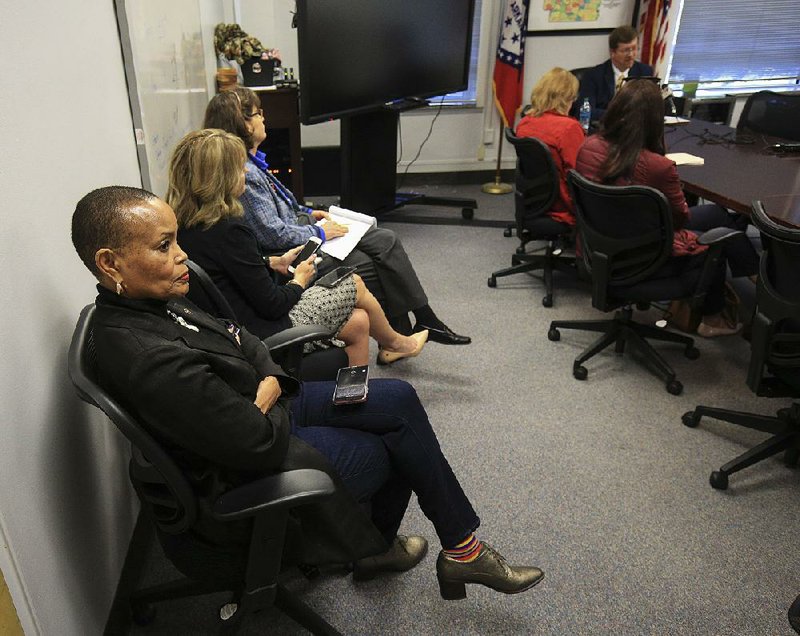Arkansas Education Commissioner Johnny Key said Tuesday that his call for a waiver of the state's teacher employment protection law in 22 D- and F-rated Little Rock schools is a newly available tool to quickly raise student achievement.
Key talked about the proposed waiver of the state's Teacher Fair Dismissal Act a day after he rejected a tentative contract agreement between the Little Rock district and the Little Rock Education Association teachers' union.
Key directed Superintendent Mike Poore to take the rejected contract back to the negotiating table to reach an agreement to waive "cumbersome" teacher dismissal laws for the nearly two dozen F and D schools that serve just under 11,000 students.
Sending a tentative agreement between the district and its teacher association back to the negotiating table for revisions is not unprecedented in recent Little Rock School District history, but a waiver of the Teacher Fair Dismissal Act in selected schools would be a first in the district and state.
"The recently released 2018 school ratings for the district reflect insufficient progress in improving academic performance in several schools," Key told reporters Tuesday in explaining the proposed waiver that would have to go to the Arkansas Board of Education for final approval. "This troubles me greatly, and I would think it would trouble the entire community," he said about what he called inconsistent achievement at the schools.
Affected D- and F-rated schools include Hall, J.A. Fair and McClellan high schools, as well as Cloverdale, Henderson, Dunbar and Mabelvale middle schools and several elementary schools.
The letter grades are based on last spring's state-mandated ACT Aspire test results, improvement on those tests since 2017 and other factors such as graduation rates, college entrance exam scores and student attendance.
Key acts as the school board for the Little Rock district, which has operated under state control since January 2015 because of chronically low student test scores at six schools at that time.
A tentative teacher contract agreement -- also known as the professional negotiations agreement -- requires ratification by Key and the association membership to be final.
Association membership had approved the initial tentative agreement earlier this month.
A full auditorium of about 300 members met again Tuesday night, Little Rock Education Association President Teresa Knapp Gordon said.
The membership directed Gordon and her team to return to the negotiating table for reopened contract talks with district leaders, she said. No date has been set for those talks.
Gordon described the mood of the members at the closed meeting as disappointed, concerned and angry. She said the association, which negotiates on behalf of all teachers and most support staff employees, has made sacrifices in recent years to help the district remain solvent. More than 60 percent of teachers are dues-paying members to the organization.
Earlier Tuesday, Gordon waited outside Key's meeting with reporters. She and Sen. Joyce Elliott, D-Little Rock, vehemently objected to the proposed waiver for 22 of the district's 40 schools, saying that teachers won't want to work at the schools without job protections that are provided to their colleagues at other campuses.
The Teacher Fair Dismissal Act establishes steps that must be taken to help an educator improve before any decision to fire the person. Those steps include observations and evaluations of the educator as well as the development of an improvement plan and a right to a hearing before the School Board.
Gordon said principals should be held at fault for not taking the steps necessary to remove teachers for poor job performance.
Elliott said teachers can make huge differences in the lives of their students but can't always overcome all the circumstances of the "marginalized," socioeconomically disadvantaged families that they serve.
Key called the proposed waiver provision "another tool in the toolbox" to help Poore and district principals create the conditions for greater and faster achievement. He listed other steps that the state has taken to aid the achievement in the district, including the appointment of teams of Education Department staffers as advisers to the schools.
More recent are statewide initiatives to improve reading instruction and develop professional learning communities of teachers to plan curriculum and address student needs.
"I'm pretty sure it would not be drastic," he said about any resulting staffing changes in the district. "This would be a tool that I'm pretty sure would not be used as a chain saw but would be used more as a scalpel to address those things that principals have identified as needing to be addressed.
"In most cases, there may not be anything that would happen," Key continued about the effect of the proposed waiver if it is approved by the state Education Board when it meets Nov. 8. "But the district and principals would have greater flexibility in making staffing decisions and staffing changes as they move forward as they get ready for the 2019-20 school year."
Key said it is not his intention that staffing changes be made at the 22 schools in the midst of the current school year.
In response to questions, Key said Poore and district principals say it can take as long as two years to follow all of the legally required steps for firing a teacher for poor job performance. He said he didn't know how many firing attempts were made, "but there have been some."
He also said principals have reported to him that there are situations where they need to make some moves, but they have been "hamstrung by the process." He also said he couldn't cite more than one specific example of a teacher termination that rose to his level as the acting school board.
The potential waiver of the Teacher Fair Dismissal Act in an academically struggling school system is a new option, Key said, made possible by Act 930 of 2017 and accompanying rules and regulations.
That law authorizes a waiver of the teacher employment protection law in a district that has been classified by the state Board of Education as a Level 5 district in need of intensive support, he said.
He said the proposed waiver is not an attempt to bash teachers, and he noted that the district is home to the state's 2019 Teacher of the Year, Stacy McAdoo, and other renowned teachers.
He also noted that the waiver might not apply just to classroom teachers but also to principals.
"Maybe the problem is not in the classroom but in the culture of the school," he said.
The education commissioner discounted arguments by the association leaders that the waiver eliminates due process rights to fair treatment, including a hearing in which they can defend themselves against accusations of poor performance.
He said the grievance procedure in the tentative agreement remains unchanged from past years.
The commissioner told reporters that he was not worried that the removal of poor performing teachers would leave schools without people to fill the positions. He said there are teachers available to fill vacancies, although some of them may not be currently teaching.
Key said he has resisted "pressure" over the past three years to not even sign an agreement and discontinue recognizing the employee union as the contract bargaining agent for the Little Rock district employees. That was the step taken when the state took control of the Pulaski County Special School District in 2011.
"I've chosen willfully not to do that because of the leadership of the LREA at the time," he said and cited the association's work with former Superintendent Baker Kurrus and with Poore.
"I felt like we might get somewhere. But when I see these results that we got a few weeks ago and understand that something else is missing ... this is one of the impediments to moving forward. The fact that we cannot be agile and nimble in making changes at the classroom and school levels. Principals and schools need flexibility," he said.
Key directed Poore to propose changes in two sections of the tentative agreement. The first is to delete language from the recognition clause in the tentative agreement and restore the language in the clause from the 2017-18 agreement.
The deleted language would be, "The LRSD shall continue its recognition of the LREA throughout the term of this agreement and during negotiations for a successor agreement."
The restored language from the current professional negotiations agreement would be: "In accordance with Board Policy, this recognition of LREA will continue so long as it is 'deemed by the board of education to be in the best interest of the employees and the District.'"
Regarding the section of the tentative agreement on board authority, Key directed Poore to add a sentence to the 2017-18 agreement. That new sentence would be: [T]he LREA and LRSD acknowledge the district is under Level 5-Intensive Support pursuant to Arkansas Code Annotated 6-15-2916, and agree to support a waiver of the Arkansas Teacher Fair Dismissal Act and the Public School Employee Fair Hearing Act only for schools receiving a grade of D or F under the Arkansas Public School Rating System.

Metro on 10/24/2018

